Bishnupur of West Bengal, a nondescript small town has a plethora of temples rich in terracotta sculptures and relics from the past. Way back several years ago in the 2015s the WB government had a proposal to convert it into a heritage town and its medieval temples dedicated to Sri Krishna built between 17th and 18th centuries, attract lots of tourists. They stand as vestiges of glorious past of this region and the heyday of the Malla kings who had built them. The WB government and the tourism department's plan included improvement of infrastructure like proper access roads, museum, recreation parks etc., there to promote tourism. Located about 150 km from Kolkata, Bishnupur is also well-known for terracotta toys and ethnic symbols like the Bankura horse (a 300-year old tradition of Panchmura Village) and most importantly Baluchari sarees.
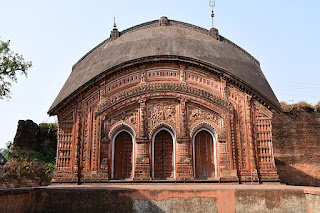 |
| Jor Bangla, Gangeswar, WB.financialexpress.com |
 |
| Bankura horses of Bishnupur, WB.topnews.in |
As for terracotta temples, they differ from conventional Hindu temples and their roofing styles make all the differences. The temples of Bishnupur as in most of West Bengal are classified as as ratnas or gems, based on the number of miniaturized pinnacled shrines atop the main curved cornice roof upon a square or rectangular structure. Such temples with unique architectural style stand with majesty despite its simplicity in the midst of manicured lush green fields.
What is quite surprising is in the absence outcrops of hard rocks or equally strong other hardstones for construction work, they've focused their attention to lateritic clay available there. The absence of proper construction materials did not prove to be a deterrent to the highly imaginative and talented architects and artisans of the past centuries. They highlighted the charms of mythological stories in baked clay tiles, giving them a new life and introduced a new form of temple architectures with complicated engravings and intricate designs like floral motif etc., that adorn the wall of the temples.
Roofing styles of terracotta temples include as follows:
1. Do-chala:
 |
| Madan Mohan temple, Bishnupur. sahasa.in |
Also known as ek-bangla, here the structure has two sloping roofs with curved cornices that meet at curved ridges. The internal structure has a rectangular plan with a chamber, enclosed under a vaulted roof. The structure similar to single-chambered huts in this region was adopted in Islamic Architecture.
2. Char-chala:
 |
| Jor Bangla, Gangeswar, WB.financialexpress.com |
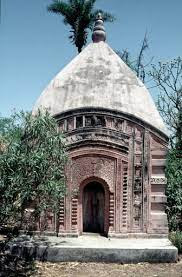 |
| Char chal temple , bengaldigital.library.cornell.edu |
Char (four) - chala temples usually have a single entrance. Roofs take two forms - straight-edged pyramidal or rounded. It is fusion of two rectangular roofs with ornamental cornices and edges This type is rare. Nadia, Murshidabad, and Birbhum districts have a few structure of this type.
000
3. At-chala
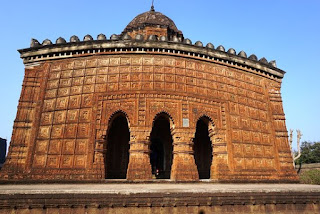 |
| Atchala madangopal temple Bishnupur, WBtripadvisor.in |
It is a sort of Char-chala type, but a truncated roof added on to it another char- chala structure. Roof of this type may look strange and was popular in the 17th and 18th centuries.
Medinipur, Howrah, Hoogley and Bankura districts. have temples of this type. Example: The Malancha Dakshina Kali temple in Medinipur.
000
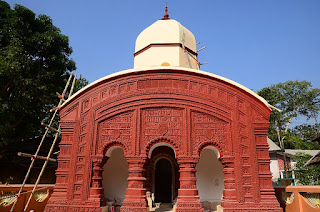 |
| Ek Ratna Gopinath temple, Radhakantapur commons.wikimedia.org |
Above image: Ek Ratna Gopinath Temple in Radhakantapur of Paschim, Medinipur district in W B; Built in 1844.
Unlike other sloping roofing styles, the Ratna style has flat roof surmounted by pinnacles, often referred to as ratnas or churas. This style reflects both Hindu and Islamic features.
5. Ek-ratna:
 |
| Ek-ratna Murali Mohan temple, Bishnupurcommons.wikimedia.org |
Temple with a single ratna on the curved roof., the inner chamber forming the sanctum. The small prakara or circumambulatory path round the sanctum can be accessed from th front as the structure is on a raised plinth.
000
06. Rasmancha:
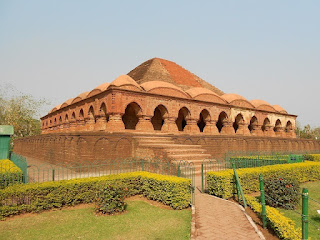 |
| Rasmancha.trawell.in.trawell.in |
This kind of style has an elongate pyramid in the center surrounded by long narrow outer passage - a sort of corridor. The structure normally rests on a raised platform made of laterites. Along the outer chamber you can see galleries containing rich terracotta work and motifs. The innermost chamber is sanctum where the idols of Radha-Krishna are installed. This temple can allow lots of people to gather inside during festival time. Such temples were built in the earliest period 1600s. ASI is managing the terracotta temple of this type and others around the town.







.jpg)


